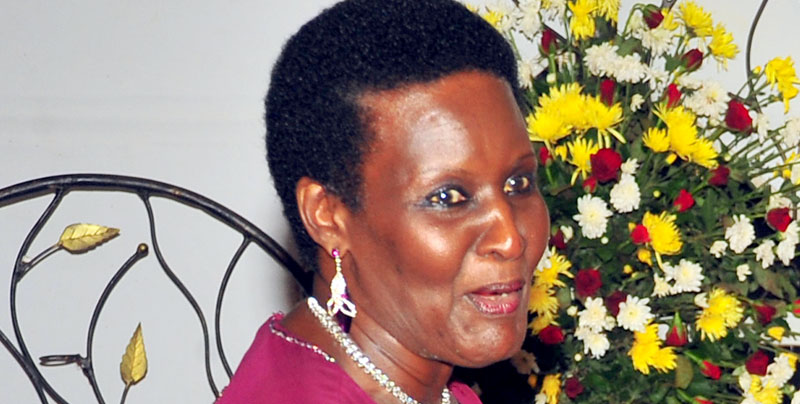human traffickingFeatures
Why traders distrust M7 on Chinese investors
It is 10:00 am at Galiraya Commercial Plaza along William Street in Kampala and the usual hustle and bustle is already in high gear.
The sight of many Chinese walking up and down the building confirms to me that it is one of Kampala’s trading hubs where numerous Chinese traders run large business dealings.
Officially, most of the Chinese shops deal in wholesale but, many engage in retail trade selling a multiplicity of products such as smart phones & accessories, fabrics, leather products and many other manufactured goods shipped from China.
As I approach the main entrance at shop L4-450, two Chinese male traders are standing at the counter along with five beautiful Ugandan girls attending to customers as two armed security men dressed in black uniforms stand akimbo side by side in guard!
But the situation is utterly different at Abbey Lwanyaga’s shop No.L4-451 just next to the Chinese shop albeit dealing in similar items.
Lwanyaga’s gaze turns to me as soon as he realizes that I am advancing towards him thinking that I could be a godsend customer for the day!
But his expression changes as soon as I introduce myself as a journalist seeking an interview about his experience in a cut-throat competition with Chinese traders.
“We are now at the mercies of God,” he says nodding his head to respond to my first question regarding the state of his business.
“These people (referring to Chinese traders) are determined to drive us out of business and it is just a matter of time before some of us find there is no point coming to the city any more, ” laments Lwanyaga.
Lwanyaga’s lamentations are widely shared in the local business community in Kampala with many traders claiming that the Chinese are underselling them with the view to dominate the local market and eventually chase Ugandans out of business.
Traders are blaming the government of Uganda for exposing them to unfair competition from the Chinese and Indian traders by unleashing them against local investors who are weak and underfunded. At the same time, local investors claim that the foreigners enjoy numerous privileges from their governments to export to emerging countries.
Andrew Rugasira, the proprietor of Good African Coffee, Uganda’s first blended coffee to be exported to Europe, America and other western countries recently blamed the government for over-liberalization of Uganda’s economy. Rugasira argued that it is wrong for Uganda to put its nascent investors on the same level of competition with players from countries where access to credit is cheaper and where businesses have enjoyed economies of scale.
The traders have in the past sought the intervention of the Uganda government and have received promises such as stopping the investors from engaging in retail businesses.
While addressing ministers and permanent secretaries in Kyankwanzi recently, President Museveni issued a directive to the effect that all Chinese and Indian traders quit retail businesses.
Perhaps in view of the fact that no progress is visible on this front, many are now dismissive of the president saying his orders were hollow and meant to excite the local businesses community but never meant to bite.
“We are now used to President Museveni’s statements because. He made similar ones in the past and not acted on them” a visibly disappointed Lwanyaga stated.
The attitude of Isa Ssekito, the spokesperson of the Kampala City Traders Association (KACITA) perhaps captures the sense of indignation among traders.
“We are only waiting to see the wisdom of government on this matter because this is a choice they have to make between baby seating foreigners whom they have allowed to infiltrate our petty businesses for whatever reasons, and letting Ugandans starve in their own territory,” Ssekito quipped.
Like Lwanyaga, Ssekitto is disappointed that President Museveni gave marching orders to all Chinese and Indians masquerading in Uganda as investors but provided no efforts to ensure the implementation of the directive.
“We quickly teamed up with Police, and also corroborated with the Immigration department and arrested over 300 Chinese traders who were involved in petty businesses in Kampala alone. But we were very disappointed when the office of the Vice President jumped to their defence frustrating all efforts to bring them to justice,” Ssekitto recalls.
He added: “No wonder Police got equally frustrated and pulled out, and that left us no other option as KACITA but to fold our hands and watch idly until they were, to our surprise released and issued work permits instead!”
Ssekitto claims the intervention of the Vice President’s office is tantamount to failure on the part of the government to have a uniform clear policy towards nurturing local businesses. Ssekitto argues the failure is having devastating consequences for Uganda and will drive locals out of business.
In addition to the mixed messages from the government, the soft stance towards foreigners still persists. Despite the president’s directive, Uganda Investment Authority (UIA) still maintains that foreign investors can still engage in small and medium enterprises which is against the proposal by local investors who want foreigners to be restricted to manufacturing.
Ssekitto argues that the Chinese already enjoy several advantages including tax refunds of up to 15% and easy access to loans at as low as 3% compared to 20% – 24% for Ugandans.
To make matters worse, according to Prossy Akampulira operating shop No. L 4-426 on the same building, some unscrupulous Chinese have flooded the market with many substandard goods which they sell at cheaper prices, sending their Ugandan counterparts out of business.
“They scout products we are selling including phones, shoes, clothes and take them to their manufacturers back in China ordering them to produce similar ones but with compromised standards.”
“And when such products are poured on the local market at cheaper prices, customers can’t tell the difference between them and the genuine ones being sold by Ugandans. They automatically line up for them making it impossible for us to sell until Chinese have sold out their stocks,” Akampulira explains.
According to Christopher Mugenyi, the chairman of Uganda Motor Spares Association (UMOSA) the growing number of Chinese investors in Uganda’s trading centers including upcountry towns such as Gulu, is indicative of a well hatched plan (by Chinese) purposed to penetrate African markets to the core.
“I for example know some Ugandans who have been chased from their business premises as a result of some Chinese offering land lords higher rent moreover for a whole year,”
“As if that is not bad enough, some Chinese have gone as far as transporting goods all the way to upcountry towns whose traders have always been buying goods from Kampala in bulk, but they have now rendered it useless for them to come to Kampala any more,” Mugenyi narrates.
Nonetheless, KACITA officials desperately decided to give it yet another try three months ago.
They engaged Members of parliament (MPs) on the Committee of trade and Industry as one of their desperate measure to bring the matter under control.
By the end of a field tour they organized for the MPs during which they sampled parts of Kampala’s business District including William Street, Kikuubo, and Nabugabo, the legislators were left with no option but to pass an ultimatum against all foreign nationals involved in petty trade to quit by December 5th 2016 of face legal action.
Analysis
The president’s threats against Chinese and Indian investors seem for the moment to be a sheer case of posturing and aimed at pleasing local investors.
This is largely because government still doesn’t believe in reversing its policy stance against open-market access. On the other hand, President Museveni’s government is highly indebted to the Chinese to the extent that such drastic measures against their interests seem inconceivable.
Out of the estimated US$10bn debt Uganda faces, China has over US$5billion.
In a nutshell, the Chinese government has demonstrated a willingness to maintain stronger ties with Ugandan authorities courtesy of numerous infrastructure projects such as roads, the Standard gauge railway, airports and electricity not to mention recent donations of among others, a hospital, planes, and the headquarters of the Ministry of foreign affairs, something that has made it even trickier for the Ugandan government amid growing calls from traders and the general public for action.
Efforts to get a comment from the Ministry of foreign affairs proved futile.
Comments




















